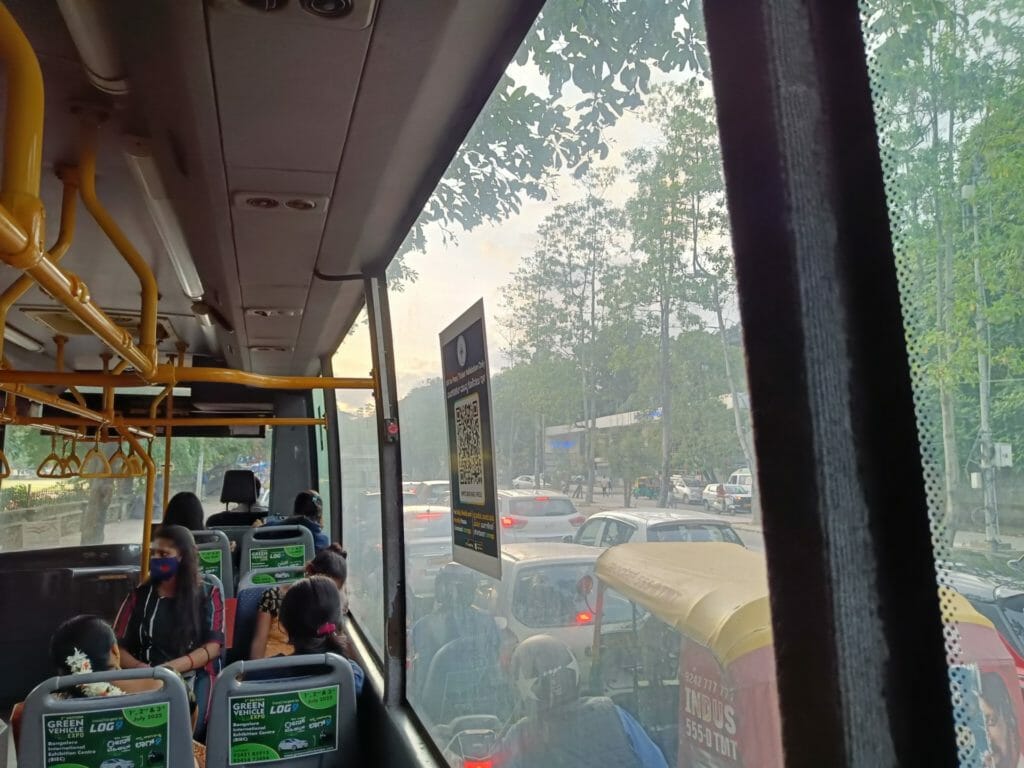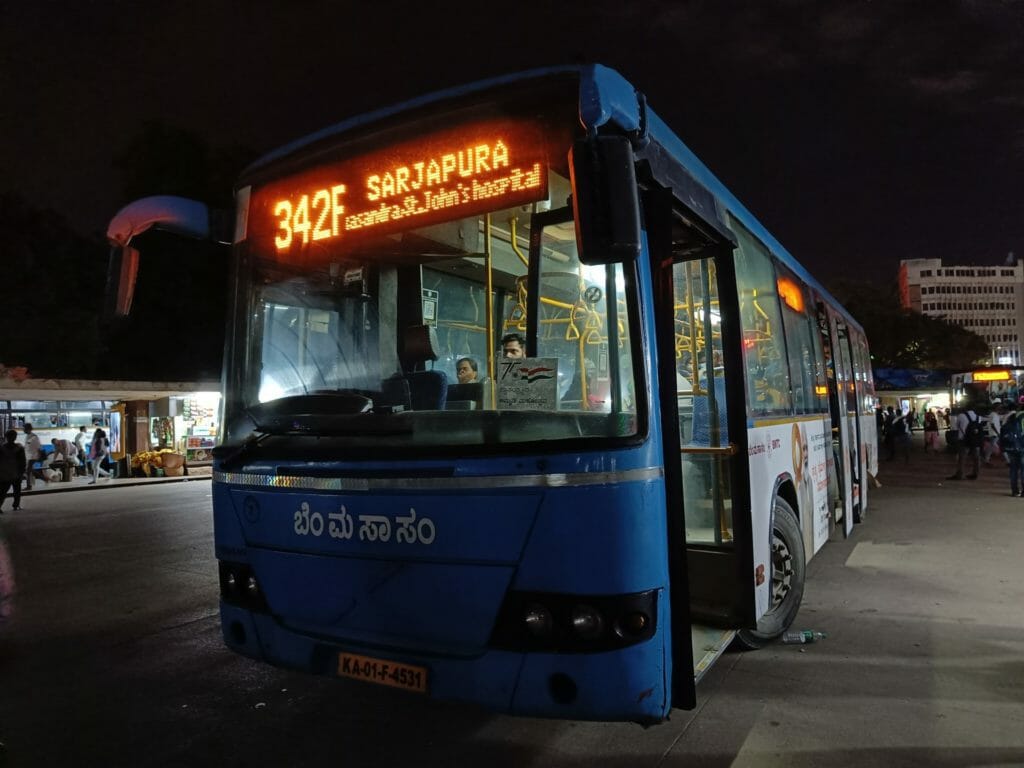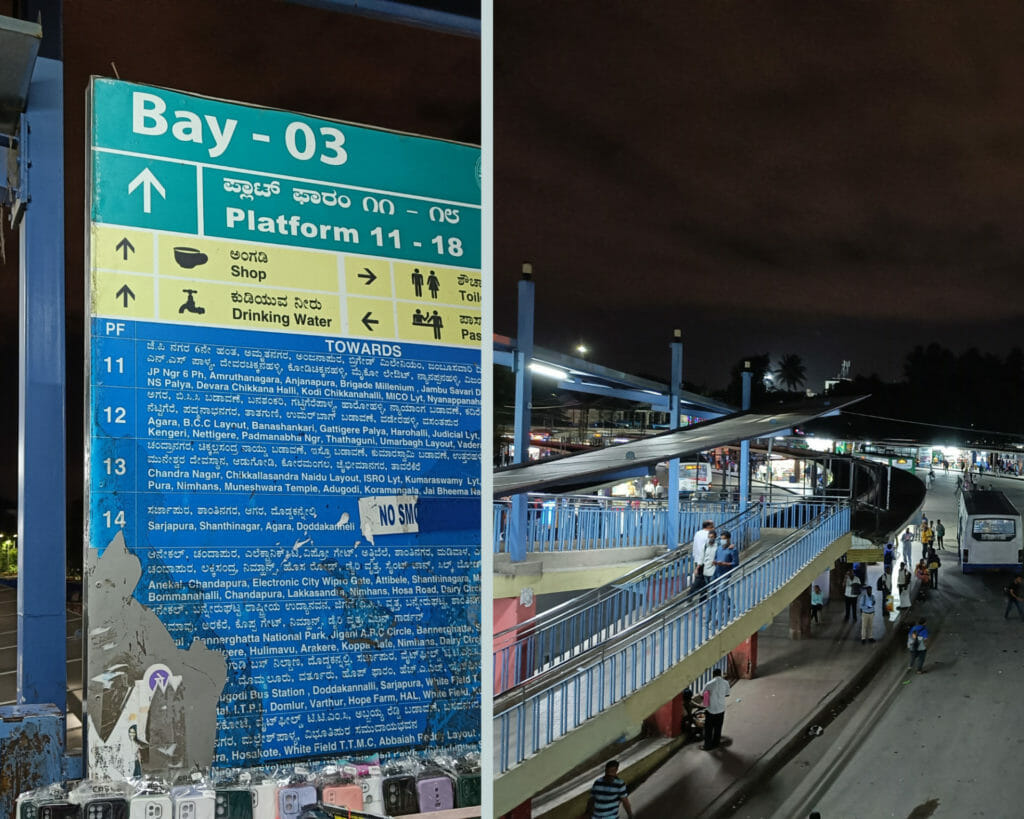50 km away from the Airport, and 30 km away from Bengaluru’s Central Railway Station, Sarjapura is one area that poses a daunting choice of address!
Located in the south-eastern part of Bengaluru, Sarjapura Road is a long stretch that ends all the way near the Karnataka-Tamil Nadu border. This mighty 20 km stretch begins at St. John’s Hospital in Koramangala and ends at the actual village of Sarjapura that the road is named after.

Sarjapura is often wrongly used to describe wards/villages that lie on Sarjapura road. From Kaikondrahalli, Doddakannali, Carmelaram, Kodathi, and Dommasandra, these are all areas with their own unique identities!
The issue of commuting on Sarjapur Road
While Namma Metro’s (Bengaluru’s Rapid Transit System) next phase has been planned to connect Sarjapura to Hebbal, it may be well over a decade until we actually see the lineup and running. In the meantime, residents of this area are limited to mainly commuting by road. There is the suburban rail available at Carmelaram but it has limited services. More details below.
Similar to the other parts of Bengaluru, Sarjapura Road is no exception from the infamous heavy traffic the city is known for. Commuting can be very expensive. Even if we’re not paying in the form of money, it most definitely costs us a lot of time and effort. The tradeoffs while using public transport in whichever part of the world you are in, remain the same. While it is the most cost-effective to travel long distances, it may not be the most convenient.
Using the Passenger Rail network for daily commute
Trains running through Carmelaram and Bellandur stations could be a good option if you want to go south towards Electronic City (Heelalige railway station) and Hosur or towards the city to areas like KR Puram, Baiyappanahalli, Manyatha Tech park, Bangalore East, Cantonment, KSR/Majestic, or Yeshwantpur.
Morning routes towards Bengaluru: Many professionals use the two passenger trains — Dharmapuri-KSR Bengaluru City train (7.30am) and Salem-Yeshwantpur train (9.30 am) that passes through Carmelram. In the other direction, there are two express trains — Ernakulam Express (7.15am) and SMVT-Karaikal Express (8.15am)
In the evening, the following trains head towards Bengaluru: Hosur-Yeshwanthpur Passenger (6.30 pm), Ernakulam express (7.30 pm) and Karaikal Express (7.30 pm)
On the other direction, the trains are — Yeshwanthpur – Hosur Special Passenger (3.45pm), Salem unreserved Express (5pm) Dharmapuri Passenger (7.15 pm), Mayiladudurai Express (7.40pm) and Kannur Express (8.30pm) – these can be boarded to reach Hosur.
Recently, plans of doubling up the railway lines have begun with the intention to further connect the city through suburban rail!
An app called Where’s My Train is helpful to track the live location of the trains running through Carmelaram.
Commuting by bus on Sarjapura Road
To make your commute easier, here is a short guide to commuting on Sarjapura road on BMTC buses!
Forget long waiting times, crowding, and overall discomfort which tend to discourage most of us from taking the bus – you will be pleased to learn that Sarjapura Road is very well connected by bus network to the rest of Bengaluru! However, some of the sub-arterial roads and side roads like Harlur Road do not have bus services but others like Kasavanahalli Road do.
Read more: How to make Bengaluru traffic jams go away
Bus routes and timings
1. Bus routes: Sarjapura Road to Bengaluru International Airport
Vayu Vajra, also known as Kempegowda International Airport (KIA) buses are your best bet to the airport. Due to the lack of awareness of its timings, as well as its origin points, commuters tend to use cabs and pay nearly ten times the amount it would take on Vayu Vajra!
| Bus number | Route | Remarks |
| 1. KIA-8D: For those in Sarjapura, KIA-8D is the closest option | Starting at Wipro/Kodathi, Hebbala, Tin factory, Marthahalli Bridge, Central Silk Board | 09:00, 10:40, 16:00, 17:40, 23:00 |
| 2. KIA-7 | HSR BDA Complex, Guttahalli, Indian Express, Shantinagar TTMC, Check post, Koramangala Water Tank, Jakkasandra | Starting from 6:00 to 22:30 |
| 3. KIA7A | HSR BDA Complex, Jakkasandra, MG Road, Shivajinagar Bus station, Mekri Circle, Hebbala | Starting from 4:30 to 23:00 Use BIAL BMTC Vayu Vajra Airport service number 7760991267 to communicate with the helpline desk to coordinate with the bus drivers |
| 4. 342F | High-frequency buses to Majestic/Kempegowda bus stand/Shantinagara TTMC | A lot of options for KIA are available from there |
Note: you can regularly find KIA buses from different points of the city. These are just a few of the options that are close to Sarjapura Road.

2. Bus routes: Sarjapura Road to Kempegowda Bus Station (Majestic)
| Bus number | Route | Remarks |
| V-342F | The flagship bus of Sarjapura, 342F (Vajra) is the go-to bus to get to most points in the city. It runs through the 20km stretch of Sarjapura main road and beyond, through main interchange points such as Iblur, Koramangala Water Tank, Shantinagar and more all the way to the heart of the city, Majestic. | The best part? It costs just Rs.45. Its alternative bus is the more frequent, non-AC variant of the same name. Priced cheaper at Rs.25 to Majestic. You will find the AC buses of 342F running frequently on weekdays, every 30 minutes or so. However, its weekend timings are not as regular. |

3. Bus routes: Sarjapura Road to Koramangala, MG Road-Brigade Road-Churchstreet and Indiranagar
| Bus number | Route | Remarks |
| a. Koramangala | ||
| G2 | G2 cuts through Koramangala 1st block and Sony World Signal. The latter of which is a good switch point if you wish to travel towards Silk Board Junction or Indiranagar. | Runs at a frequency of every 15–20 minutes. Its last stop is at Mayo Hall, which is very close to MG Road and Trinity Metro Station on the Purple Line. |
| D15 | Another bus that can be found on Sarjapura road is the D15 which ends at Koramangala TTMC. | However, the timings for these buses are not the most reliable. |
| 342H, 342F, 342A | The 342 series of BMTC buses are those that run through the Sarjapura main road. Most of them cover the entire stretch, but some stop midway at places like Doddakannali, Kodathi Gate or even Dommasandra. | The three buses that are the most regular, which begin at Sarjapura bus stand. Taking either of the three buses mentioned here will take you to major bus stops around Koramangala: Koramangala 1st Block, Koramangala Water Tank, St John’s Hospital, and Madivala Checkpost. |
| b. MG Road/Brigade Road/Church Street | ||
| G2 | G2’s final stop is Mayo Hall, which is a 5-minute walk from any of the above-mentioned areas. Alternatively, you can also board 342F which would take you to Shantinagar /Richmond Circle— where you have the option to board another bus, or even walk to your desired destination. However, in case you want a direct bus, it’s best to wait for a G2 due to its high frequency and shorter trip time. | The frequency is great – every 15 minutes or so. Since MG Road is well connected to the Metro, this can also be a great switching point to visit any places that are connected by Namma Metro! |
| c. Indiranagar | ||
| G2, 201, 342F/342A, 201/210 | Getting to Indiranagar from Sarjapura by bus would require switching buses at least once. | The interchange point is either Koramangala Water Tank or Sony World Signal. |
| G2 | Taking a G2 to Sony Signal in Koramangala, and boarding a 201 from there is a sure-shot way to get you to Indiranagar. | It is extremely reliable and runs at a good frequency. |
| 342F/342A | To Koramangala Water Tank – followed by 201 series | From Koramangala Water Tank, you will be greeted with a range of 201 buses heading towards Indiranagar. |
Read more: BMTC buses may be the only solution to solve Bengaluru’s mobility issues
4. Bus routes: Sarjapura Road to Banashankari, JP Nagar or Jayanagar
The ‘old’ part of town, as some people describe it, is classic Bengaluru with massive trees and beautiful greenery! I have clubbed areas surrounding Banashankari, such as JP Nagar, Jayanagar, Basavanagudi, etc. In this section, due to the presence of the Namma Metro Green line, getting to neighbouring areas wouldn’t be a problem at all! Getting here is a lengthy commute via bus and generally requires you to switch buses at least once.
| Bus number | Route | Remarks |
| 500CF | A rare bus that takes you straight to Banashankari from Sarjapura! | Its timings are not the most reliable, and it is not frequent at all so I wouldn’t recommend waiting for one. But, in case you find it, enjoy your direct bus! |
| 342 series to Iblur or Agara Junction 500CA from there to Banashankari | Given the low frequency of the 500CH, getting to this part of town generally needs switching. You could take any bus to Agara Junction, and quickly make your way to the service road, where buses moving to Banashankari stop. Here, you will be greeted with regular 500CA (Vajra) buses that head to Banashankari! | There are also various other 500 series buses that are very regular, but make sure you ask where the final stop is as some stop at Central Silk Board. |
5. Bus routes: Sarjapura Road to Bellandur, Marathahalli, Tin Factory or Whitefield
| Bus number | Route | Remarks |
| a. Bellandur/Marathalli/Tin Factory | ||
| 500CH 500EB | The recently introduced 500CH and 500EB buses wish to ease the burden on the roads of the tech corridor by connecting Sarjapura to Tin Factory! These buses are great. Regular in its frequency, they run through arguably the worst areas in the city. With tickets priced at 25rs, getting to Tin Factory is a good idea in case you need to board a train from KR Puram or need to get to anywhere else in the Eastern part of the city! | 500EB, starting at Electronic City, is a metro feeder bus that goes all the way to Byappanahalli metro on the purple line. Thus, in case you wish to take the metro, this is a great route beginning at Kaikondrahalli on Sarjapura road. |
| Alternatively, you could take any bus that stops at Iblur Junction which is also known as Sarjapura Signal and take a 500 series bus towards your desired destination! | This is also a good switch point to travel in the direction of HSR Layout and Silk Board. However, the bus stop is currently situated on the main road without a dedicated waiting area. Thus, be careful and watch your step while deboarding as the speeding traffic behind you may not realise it’s currently a de facto bus stop. | |
| b. Whitefield | ||
| 328H | Any bus ending at Hoskote runs through Whitefield. The number to remember here is 328. | A thing to remember here is that unlike the other buses mentioned here, the 328 generally begins at Attibele. Thus, they tend to be filled by the time they reach Sarjapura. |
6. Bus routes: Sarjapura Road to Electronic City
| Bus number | Route | Remarks |
| a. Electronic City | ||
| 342 – 500EB | Getting to Electronic City from the Sarjapura bus stand would require a minimum of two buses. You would need to go to Attibele first, and from there board another in the direction of Bengaluru city. | Alternatively, the newly introduced 500EB is another great route connecting Whitefield to Byappanahalli Metro Station! This runs through Hosa run and finally enters Sarjapura road through Kaikondrahalli and takes a turn at the Iblur junction towards ORR. |
| KBS3A/360B/600F | Attibele to Electronic City | A range of buses run from Attibele to the city. Any of the above options would take you through Electronic City. |
| b. Kaikondrahalli | ||
| 500EB | Kaikondrahalli to Electronic City |
7. Bus routes: Sarjapura Road to Yelahanka
Getting to Yelahanka is difficult. It’s a cross-country trip that takes a minimum of two hours including a mandatory bus switch!
| Bus number | Route | Remarks |
| 342F/285 series | 342F to Majestic followed by 285, 298 or any other bus no. that moves to Yelahanka! Once at Majestic, you needn’t worry about knowing the exact bus numbers as you can check with people around as to which bus goes where with ease. | It would cost you a minimum of Rs.50/-, contrasted with a cab fare which would be around Rs.1,500! |
Read more: Bengaluru bus commuters release their wishlist to make BMTC work for all
Tips to travel in Bengaluru buses
Organisations working to help BMTC:
With apps such as Tummoc, Moovit, and other citizen-run initiatives such as FriendsofBMTC, Bus4Us, Bus Prayanikara Vedike, and more. BMTC buses have a loyal fan following in the city, constantly pushing the authorities to get better!
FriendsofBMTC is a telegram group created to provide live tracking of buses. These real-time updates can help you anticipate buses approaching you and plan your travel better. Additionally, people in the group are dedicated to answering any query you may have on buses and routes!
Plan ahead!
If you’re travelling anywhere in the city, it’s always best to plan ahead if you wish to have the smoothest experience getting to your destination. While cabs offer you comfort, the general trend of cancelling and surge prices is not something you will find in BMTC! If you are in a place that allows you to leave early, give it a shot as BMTC buses start as early as 5 am! I have often taken the bus early in the morning before the peak hour congestion hits the streets of Bengaluru!
Go digital — buy a bus pass
Different kinds of BMTC Bus Passes and their Rates: Currently, six kinds of bus passes exist:
- Ordinary Day Pass: Rs.70
- Vajra Gold Day Pass: Rs.100
- Ordinary Weekly Pass: Rs.300
- Ordinary Monthly Pass: Rs.1050
- Vajra Gold Monthly Pass: Rs.1500
- Vayu Vajra Gold (Airport) Monthly Pass: Rs.3650
Opting for Tummoc’s digital pass is a great idea if you see yourself needing to commute regularly. You get to save a lot of money and also save yourself the stressful hassle of transacting cash with the bus conductors. Every bus is equipped with a QR code that can be easily scanned and work as your bus pass!
Other perks of having a pass: Imagine you are on a super-crowded bus, your destination is over an hour away, but you find yourself spotting a relatively empty bus just behind you. You could quickly make the shift to that bus at your next stop without needing to pay extra! This can also be applicable for buses that may not take you to the last mile.
Commuting from the origin
If you are blessed with ample time, I would advise you to visit your nearest TTMC (Traffic Transit Management Centers), or bus origin point if it’s not too far away, even if it means you need to go the other direction. Boarding a bus from the origin will make your journey so much more comfortable and offer you the much required time to make your journey productive! From catching up on podcasts, reading, watching videos or even sleeping! Your commute time can be maximized to its fullest if you are comfortably seated. So, what are you waiting for? Give BMTC a shot today and share your experiences!
[M Shivakeshava also contributed to this article.]
Also read:
- The whys and hows of Bengaluru’s infamous traffic jams — a personal experience through Iblur junction
- Traffic congestion, chaos reigns at the Sarjapur-Attibele junction
- Better mobility design can encourage the use of public transport, cycling and walking
- A sustainable plan to solve traffic woes at Iblur Junction
A good write up on BMTC.But it’s actual operation is very pathetic compared to 1990s.The concerned authorities should understand and work on the ground and try to market the BMTC buses.You can see many of the buses the occupancy ratio is less than 20 and in fact they add to block the traffic on the roads.The size of the buses are big and cannot accommodate the blore roads particularly the arterial roads and to navigate such big buses is not only difficult but also time consuming and creates blocked roads .
Agree with Murali. I still remember how ‘Metropole’ long buses were introduced and how drivers were struggling to negotiate narrow roads and circles and also complained. Later they were transferred to Mysuru and after same experience and complaint, they vanished. We need to popularise Metro rail to many extensions with mini- standing only buses at economical fares to serve as feeder routes to reach Metro stations.
Much needed article and an eye opener. Thanks a ton for saving our time.
Well-written and informative article. Thank you, Vikas. Hope it also attracts the attention of BMTC authorities to improvise their services. I wish you write many more informative and interesting articles. Thumbs up.